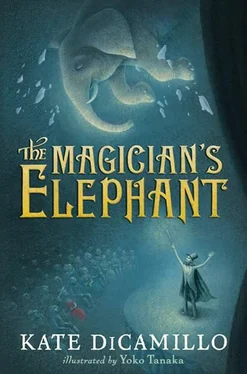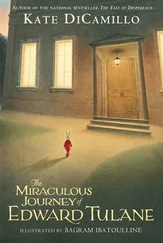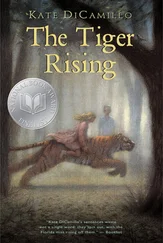“Please,” said the boy.
And suddenly it came to Hans Ickman, the name of the little white dog. Rose. She was called Rose. And remembering was like fitting a piece of a puzzle into place. He felt a wonderful certainty. The impossible, he thought, the impossible is about to happen again.
He looked past the policeman and the boy and into the darkness beyond them. He saw something swirl through the air. A snowflake. And then another. And another.
“Come in,” said Hans Ickman. He swung the door wide. “You must come inside now. The snow has begun.”
It had indeed begun to snow. It was snowing over the whole of the city of Baltese.
The snow fell in the darkened alleys and on the newly repaired tiles of the opera house. It settled atop the turrets of the prison and on the roof of the Apartments Polonaise. At the home of the Countess Quintet the snow worked to outline the graceful curve of the handle on the elephant door; and at the cathedral it formed fanciful and slightly ridiculous caps for the heads of the gargoyles, who crouched together, gazing down at the city in disgust and envy.
The snow danced around the circles of light that pulsed from the lamps lining the wide boulevards of the city of Baltese. The snow fell in a curtain of white all around the bleak and unprepossessing building that was the Orphanage of the Sisters of Perpetual Light, as if it were working very hard to hide the place from view.

The snow, at last, fell.
And as it snowed, Bartok Whynn dreamed.
He dreamed of carving. He dreamed of doing the work he knew and loved: coaxing figures from stone. Only, in his dream, he did not carve gargoyles, but humans. One was a boy wearing a hat; another, a man with a moustache; and another, a woman sitting, with a man standing to attention behind her.
And each time a new person appeared beneath his hand, Bartok Whynn was astonished and deeply moved.
“You,” he said as he worked, “and you and you. And you.”
He smiled.
And because it was a dream, the people he had fashioned from stone smiled back at him.
As the snow fell, Sister Marie, who sat by the door at the Orphanage of the Sisters of Perpetual Light, dreamed too.
She dreamed that she was flying high over the world, her habit spread out on either side of her like dark wings.
She was terribly pleased, because she had always, secretly, deep within her heart, believed that she could fly. And now here she was, doing what she had long suspected she could do, and she could not deny that it was gratifying in the extreme.
Sister Marie looked down at the world below her and saw millions and millions of stars and thought, I am not flying over the earth at all. Why, I am flying higher than that. I am flying over the very tops of the stars. I am looking down at the sky.
And then she realized that no, no, it was the earth that she was flying over, and that she was looking not at the stars but at the creatures of the world, and that they were all, they were each – beggars, dogs, orphans, kings, elephants, soldiers – emitting pulses of light.
The whole of creation glowed.
Sister Marie’s heart grew large in her chest, and her heart, expanding in such a way, allowed her to fly higher and then higher still – but no matter how high she flew, she never lost sight of the glowing earth below her.
“Oh,” said Sister Marie out loud in her sleep, in her chair by the door, “how wonderful. Didn’t I know it? I did. I did. I knew it all along.”
Hans Ickman pushed Madam LaVaughn’s wheelchair, and Leo Matienne had hold of Peter’s hand. The four of them moved quickly through the snowy streets. They were heading to the home of the countess.
“I do not understand,” said Madam LaVaughn. “I find this all highly irregular.”
“I believe the time has come,” said Hans Ickman.
“The time? The time? The time for what?” said Madam LaVaughn. “Do not speak to me in riddles.”
“The time for you to return to the prison.”
“But it is the middle of the night, and the prison is that way,” said Madam LaVaughn, flinging a heavily bejewelled hand behind her. “The prison is in entirely the opposite direction.”
“There is something else that we must tend to first,” said Leo Matienne.
“And what is that?” said Madam LaVaughn.
“We must retrieve the elephant from the home of the countess,” said Peter, “and take her to the magician.”
“Retrieve the elephant?” said Madam LaVaughn. “Retrieve the elephant? Take the elephant to the magician? Is he mad? Is the boy mad? Is the policeman mad? Has everyone gone mad?”
“Yes,” said Hans Ickman after a long moment. “I believe that is the case. Everyone has gone a little mad.”
“Oh,” said Madam LaVaughn, “very well. I see.”
They were silent together then: the noblewoman and her servant, the policeman and the boy walking beside him. There was only the sound of the wheelchair moving through the snow and three pairs of footsteps striking the muffled cobblestones.
It was Madam LaVaughn who at last broke the silence. “Highly irregular,” she said, “but quite interesting, very interesting indeed. Why, it seems as if anything could happen, anything at all.”
“Exactly,” said Hans Ickman.
In the prison, in his small cell, the magician paced back and forth. “And if they succeed?” he said. “If they manage, somehow, to bring the elephant here? Then there is no helping it. I must speak the words. I must try to cast the spell again. I must work to send her back.”
The magician paused in his pacing and looked up and out of his window and was amazed to see snowflake after snowflake dancing through the air.
“Oh, look,” he said, even though he was alone. “It is snowing – how beautiful.”
The magician stood very still. He stared at the falling snow.
And suddenly he did not care at all that he would have to undo the greatest thing he had ever done.
He had been so lonely, so desperately, hopelessly lonely for so long. He might very well spend the rest of his life in prison, alone. And he understood that what he wanted now was something much simpler, much more complicated than the magic he had performed. What he wanted was to turn to somebody and take hold of their hand and look up with them and marvel at the snow falling from the sky.
“This,” he wanted to say to someone he loved and who loved him in return. “This.”
Peter and Leo Matienne and Hans Ickman and Madam LaVaughn stood outside the home of the Countess Quintet; they stared together at the massive, imposing elephant door.
“Oh,” said Peter.
“We will knock,” said Leo Matienne. “That is where we will begin, with knocking.”
“Yes,” said Hans Ickman. “We will knock.”
The three of them stepped forward and began to pound on the door.
Time stopped.
Peter had a terrible feeling that the whole of his life had been nothing but standing and knocking, asking to be let into some place that he was not even certain existed.
His fingers were cold. His knuckles hurt. The snow fell harder and faster.
“Perhaps this is a dream,” said Madam LaVaughn from her chair. “Perhaps the whole thing has been nothing but a dream.”
Peter remembered the door in the wheat field. He remembered holding Adele. And then he remembered the terrible, heartbroken look in the elephant’s eyes.
“Please!” he shouted. “Please, you must let us in.”
“Please!” shouted Leo Matienne.
“Yes,” said Hans Ickman, “please.”
Читать дальше













